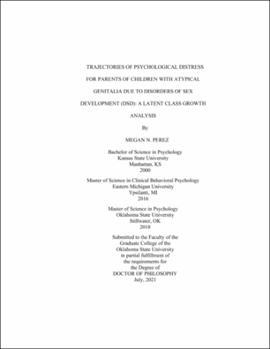| dc.contributor.advisor | Mullins, Larry L. | |
| dc.contributor.author | Perez, Megan N. | |
| dc.date.accessioned | 2022-01-21T19:19:57Z | |
| dc.date.available | 2022-01-21T19:19:57Z | |
| dc.date.issued | 2021-07 | |
| dc.identifier.uri | https://hdl.handle.net/11244/333768 | |
| dc.description.abstract | Objective: The current study sought to identify individual trajectories of parent depressive symptoms after having a child born with genital atypia due to a disorder of sex development (DSD) and across the first year post-genitoplasty (for parents who opted for surgery) or post-baseline (for parents who elected against surgery for their child). Hypotheses for four trajectory classes were guided by parent distress patterns previously identified among other medical conditions. | |
| dc.description.abstract | Methods: Participants included 70 mothers and 50 fathers of 71 children diagnosed with a DSD with moderate to severe genital atypia. Parents were recruited from 11 US DSD specialty clinics within two years of the child's birth and prior to genitoplasty, and were followed up at one-year post-genitoplasty/post-baseline. A growth mixture model (GMM) was conducted to identify classes of parent depressive symptoms over time. | |
| dc.description.abstract | Results: The best fitting model was a five-class linear GMM with freely estimated intercept variance, in which the classes identified were termed: "Resilient" , "Recovery" , "Chronic" , "Escalating", and "Elevated Partial Recovery" . The first four classes are consistent with the previous literature. However, a fifth class of "elevated distress" was additionally identified. The "Resilient" class was the largest (67.6%) and the one in which the majority of fathers (86%) were placed. | |
| dc.description.abstract | Conclusions: The current study provides insight into individual parental distress trajectories. Future studies are needed to identify developmental, medical, or familial predictors of these trajectories. Moreover, evidence-based interventions specifically tailored to parents of children with DSD are needed to assist families who experience clinically significant and ongoing distress. | |
| dc.format | application/pdf | |
| dc.language | en_US | |
| dc.rights | Copyright is held by the author who has granted the Oklahoma State University Library the non-exclusive right to share this material in its institutional repository. Contact Digital Library Services at lib-dls@okstate.edu or 405-744-9161 for the permission policy on the use, reproduction or distribution of this material. | |
| dc.title | Trajectories of psychological distress for parents of children with atypical genitalia due to disorders of sex development (DSD): A latent class growth analysis | |
| dc.contributor.committeeMember | Chaney, John M. | |
| dc.contributor.committeeMember | Clawson, Ashley H. | |
| dc.contributor.committeeMember | Welch, Ginger | |
| osu.filename | Perez_okstate_0664D_17067.pdf | |
| osu.accesstype | Open Access | |
| dc.type.genre | Dissertation | |
| dc.type.material | Text | |
| dc.subject.keywords | differences of sex development | |
| dc.subject.keywords | intersex | |
| dc.subject.keywords | psychosocial | |
| thesis.degree.discipline | Psychology | |
| thesis.degree.grantor | Oklahoma State University | |
